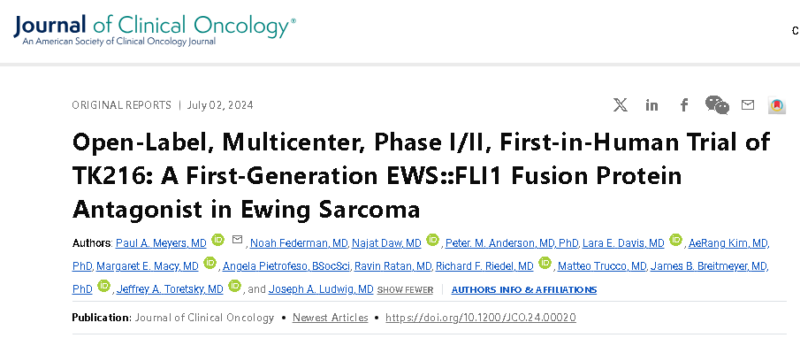
New Chapter in Ewing Sarcoma Treatment – The story of TK216
Shushan Hovsepyan shared a post on LinkedIn about a recent paper by Paul Meyers et al. published in the Journal of Clinical Oncology, commenting:
“New Chapter in Ewing Sarcoma Treatment? The story of TK216.
JCO Oncology recently published an important study exploring a new therapeutic agent for Ewing Sarcoma, particularly for patients with relapsed/refractory disease.
Targeting EWS: FLI1 Fusion Protein for the first time
The open-label, multicenter, phase I/II, first-in-human study evaluated TK216, an antagonist inhibiting the EWS:: FLI1 fusion protein.
Why TK216?
It is well known that EWS::FLI1 fusion protein is a critical driver in the oncogenesis and tumor growth in Ewing sarcoma. Therefore, targeting it directly is a logical and potentially effective therapeutic approach.
What is the hypothesis?
- TK216 binds to EWS::FLI1
- RNA Helicase and other proteins are displaced and no longer bind to EWS::FLI1
- Transcription and splicing of mRNA is altered
- EWS::FLI1 interaction with chromatin regulators is disrupted
Key Findings
85 participants; mean age 28.9 years, white, with heavy pre-treatment histories.
Treatment and Safety:
- Dosing: RP2D at 200 mg/m² for 14 days
per 28-day cycle. - Safety: Most AE were grade 1 or 2 (neutropenia, anemia, and leukopenia being the most common)
Efficacy: Out of 48 patients treated at the RP2D two experienced complete responses, one had a partial response, and 14 achieved stable disease. These results are significant for a heavily pretreated population.
Limitations: Challenges included continuous infusion, a lack of pharmacodynamic readouts, and difficulties obtaining necessary biopsy samples.
Future Directions:
- Reformulating TK216 for oral administration could improve patient participation and adherence.
- Including tumor and germline DNA analysis in future trials could enhance understanding of treatment responses and resistance.
Key Takeaways:
It shows that targeting fusion oncoproteins is feasible with manageable side effects. However, refining drug formulation and trial methodologies will be essential for advancing treatments for ES and other sarcoma subtypes.”
Authors: Paul A. Meyers, Noah Federman, Najat Daw, Peter M. Anderson, Lara E. Davis, AeRang Kim, Margaret E. Macy, Angela Pietrofeso, Ravin Ratan, Richard F. Riedel, Matteo Trucco, James B. Breitmeyer, Jeffrey A. Toretsky, Joseph A. Ludwig

Source: Shushan Hovsepyan/LinkedIn
Shushan Hovsepyan is a pediatric oncologist and adjunct assistant professor at the Yerevan State Medical University. Currently, she is the Editor-in-Chief of OncoDaily Medical Journal.
She completed her clinical fellowship at the National Institute of Cancer in Milan, Italy and at the St. Anna Children’s Research Hospital in Austria Furthermore, she held a research fellowship position at the European Organisation for Research and Treatment of Cancer in Brussels, Belgium.
Dr. Hovsepyan also completed the Postgraduate Harvard Medical School’s Effective Writing for Healthcare program. She is a former co-chair of the SIOP Global Health Network Education and Training Working Group.
-
Challenging the Status Quo in Colorectal Cancer 2024
December 6-8, 2024
-
ESMO 2024 Congress
September 13-17, 2024
-
ASCO Annual Meeting
May 30 - June 4, 2024
-
Yvonne Award 2024
May 31, 2024
-
OncoThon 2024, Online
Feb. 15, 2024
-
Global Summit on War & Cancer 2023, Online
Dec. 14-16, 2023
